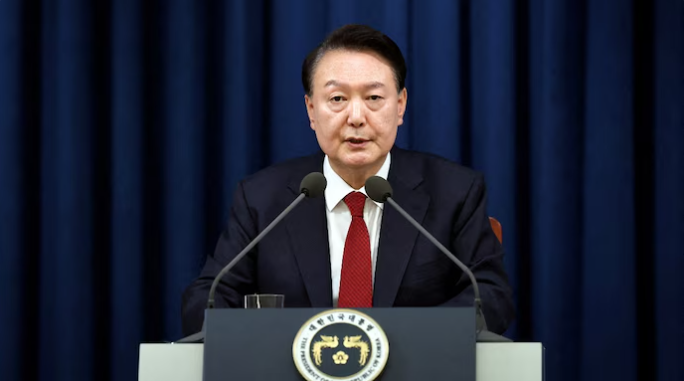Introduction
South Korea’s political landscape was recently shaken as President Yoon Suk-yeol faced an impeachment motion over a controversial martial law row. The motion, brought forth by the main opposition Democratic Party, failed to garner the required two-thirds majority in the National Assembly, leaving the political climate fraught with tension and division.
The failed bid has not quelled the unrest, with the opposition vowing to reignite their efforts amid public protests. Although President Yoon has apologized for the turmoil, his decision to leave his fate to his ruling People Power Party (PPP) has drawn mixed reactions. This article explores the events leading to the impeachment motion, the reasons for its failure, and the broader implications for South Korea’s democracy and governance.
Background: The Martial Law Controversy
The impeachment motion stemmed from allegations that President Yoon mishandled discussions around the potential invocation of martial law to quell public protests. Critics argue that such measures would have undermined democratic principles, stifling dissent and threatening civil liberties. 
Timeline of Events
- Initial Protests: Public demonstrations erupted over alleged government mismanagement of economic policies and controversial judicial reforms.
- Martial Law Discussion: Reports surfaced that senior officials in the Yoon administration had debated imposing martial law to curb protests, sparking outrage among opposition leaders and activists.
- Opposition’s Move: The Democratic Party accused President Yoon of authoritarian tendencies and introduced an impeachment motion in the National Assembly.
The Impeachment Vote: A Divided Assembly
The Democratic Party, which holds a majority in the 300-member National Assembly, South Korea’s required 200 votes for the motion to pass. However, the ruling PPP boycotted the vote, significantly reducing the likelihood of success.
Key Numbers
- Votes in Favor: 179
- Votes Against/Abstentions: 121
The boycott underscored the deep partisan divide in South Korea’s legislature, with the PPP labeling the impeachment motion as a political stunt.
Opposition’s Stance
The Democratic Party has pledged to continue its efforts, South Korea’s calling the failed motion a temporary setback. Party leaders argue that President Yoon’s actions have eroded public trust and set a dangerous precedent for democratic governance.
Statements from Opposition Leaders
- “This is not the end. We will pursue all legal and political avenues to hold the President accountable,” said a senior Democratic Party official.
- “The debate over martial law is a stain on our democracy, and we must address it head-on,” added another party spokesperson.
The opposition has also leveraged public discontent, organizing rallies to galvanize support for their cause.
Ruling Party’s Response
President Yoon and the PPP have dismissed the impeachment motion as baseless, South Korea’s asserting that the martial law discussions were hypothetical and never intended for implementation.
President Yoon’s Apology
In a televised address, President Yoon expressed regret over the political turmoil but maintained his innocence.
- “I deeply apologize for the unrest this issue has caused. However, I trust my party and the people of South Korea to judge my actions fairly,” he said.
PPP’s Strategy
The PPP has rallied around Yoon, framing the impeachment attempt as an overreach by the opposition.
- “This motion was a clear attempt to undermine the government and destabilize the country,” said a PPP representative.
Public Reaction
The martial law controversy and impeachment proceedings have polarized public opinion, with large-scale protests both for and against President Yoon.
Pro-Impeachment Protests
- Protesters have criticized the government’s alleged authoritarian tendencies, accusing Yoon of disregarding democratic norms.
- Demonstrators have called for accountability and transparency, South Korea’s chanting slogans like “No to Martial Law, Yes to Democracy!”
Pro-Government Support
- Supporters of President Yoon argue that the opposition is using the impeachment motion as a distraction from its own shortcomings.
- Many believe that the President’s economic policies are vital for South Korea’s recovery and stability.
Implications for South Korea’s Democracy
The failed impeachment motion highlights several challenges facing South Korea’s democratic system:
1. Deepening Partisan Divide
The polarized political environment has made consensus-building increasingly difficult, South Korea’s undermining effective governance.
2. Public Trust in Institutions
The controversy has eroded trust in both the government and opposition, with many citizens expressing frustration over political infighting.
3. Risks to Civil Liberties
The martial law debate has raised concerns about the potential for authoritarian measures in times of crisis, prompting calls for stronger safeguards.
What’s Next?
The Democratic Party has vowed to revisit the impeachment motion, South Korea’s potentially escalating tensions in the National Assembly. Meanwhile, President Yoon faces the challenge of restoring public confidence while navigating an increasingly adversarial political landscape.
Potential Scenarios
- Renewed Impeachment Efforts: The opposition could introduce a revised motion, focusing on broader grievances against Yoon’s administration.
- Judicial Intervention: The Constitutional Court may be asked to weigh in on the martial law discussions, setting a legal precedent.
- Public Mobilization: Protests and civic engagement could play a decisive role in shaping the outcome of this political crisis.
Conclusion
President Yoon Suk-yeol’s escape from impeachment marks a critical juncture in South Korea’s political landscape. While the failed motion provides temporary relief for his administration, South Korea’s the underlying tensions remain unresolved.
As the nation grapples with questions of accountability, governance, and democratic integrity, the actions of its leaders in the coming months will be closely watched. For South Korea, this controversy serves as a stark reminder of the importance of protecting democratic values in the face of political and societal challenges. ALSO READ:-Nobel Laureates Hinton and Hassabis Call for Robust AI Regulation to Safeguard Humanity 2024